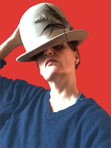Lulu Allison's Blog
October 20, 2025
Granular, Diverse, Mainstream, Messy, Normal
All of us know a family with an extraordinary story. Searching for the unusual we never have to look far. All lives, at least in moments, are unpredictable, varied and strange. For all that we can easily identify the patterns and shared experiences uniting us, much of what we see and do falls into the category of the unexpected. And the same goes for the types, the characters inhabiting our world. Real souls who would be presumed invention were they written in a book. People may loosely conform to patterns but all have foibles and eccentricities. We are not in any way perturbed by this, for all it takes is the most cursory overview to confirm that it is so.
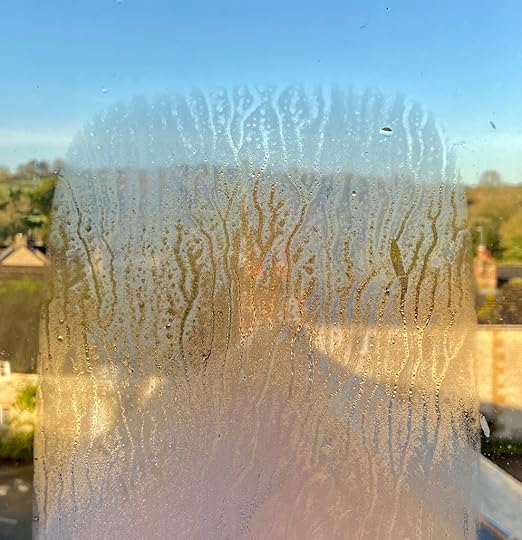
There are many characters who, by temperament, habit, taste and experience, loosely occupy what we call the mainstream. If we were to amalgamate and average them out, we would be close to what is commonly known as normal. Perhaps this is useful, but not nearly so much as we are used to pretending. Even the most conservative will deviate in subtle ways from this convenient absolute. So, diversity is everywhere, in so granular a manner as almost to not exist.
As useful as it has been over recent years to have diversity as a lens through which to view society and culture, neurodivergence at least is a term that in certain ways might have outgrown its usefulness. I am not talking about medical distinctions and recognise fully that there may be situations that require this concept. It is the use as an every day, casual descriptor, creating distinctions in widely observable traits that, when considering the totality of human experience, might better be seen as an integral part of the mix. All of us belong in that mix.
Neurodivergence has been a helpful term for many families navigating the world and it has been a blessing that these conversations (not available in even the recent past) arrived to broaden understanding, offer support and create a context in which people can see, support and nourish themselves. This is vitally important. But why not take it further, into a more fundamental understanding and acceptance of how this human animal works?
Politics, and the culture-wars literally attempting to legislate diversity out of human life, has brought this more sharply into focus.
When I wrote Salt Lick I was in one chapter imagining, through the eyes of the main character Isolde, the complexity of a city. A city is the perfect illustration of our under-acknowledged collectivism; its complexity, the way accident and design rub up against each other in an endless inventive dance, how chance and opportunism, like weeds, fill the gaps, expanding the parameters of what that city is. No city is completely designed and laid down only in pre-determined order. Such imposition, such discipline, simply does not work when it comes to the way humans live. We design and designate, we bodge, convert, take opportunities, we benefit from chance, we make do; and it is all of these processes that create and advance human society.
We are utterly interdependent.
Much is owed to the practises and processes of those whose thinking patterns fall into the loose designation of neurotypical. And we certainly need them. But equally we need the people described as neurodivergent. So much so that it seems odd to designate these supposedly divergent ways of thinking as being something other than an equal part of the mainstream. The ones whose magpie musings may find a new pattern, the ones who get bored, can’t concentrate on routine and end up discovering new views, new ideas, the ones who say ‘what happens if I …?’ The ones with absolute focus on the unnoticed. The ones who loan out their imaginations to others too busily occupied to exercise their own.
All ways of thinking, of asking questions, of experiencing the world, usefully and beautifully add something to it. There is nothing divergent about this: it is how humans, collectively, are. The diversity of the whole is precisely what is normal, and fundamentally necessary – for all of us. Where would we be without all types of thinkers? From what are we diverging? Certainly not from being an ordinary human. There is where we all belong.
October 14, 2025
Banned Books – Alert! Alert! Freaks and Weirdos and Scary Ideas!
I wrote this essay for Dorset Eye as a part of their recent Banned Books Week focus.
In a mindless scroll through social media yesterday, due, I hasten to add, to a friend’s indignation rather than my own preferences, I accidentally noticed ex-footballer Joey Barton.
Joey Barton, found guilty earlier this year of kicking his wife in the head, is of the opinion that women playing football is bad because REAL women don’t WANT to play football. A few listless sweeps later and there’s some preppy dude, a ‘right wing commentator’, explaining what REAL Englishness constitutes, how that means, truthfully and scientifically, that Englishness is and can only ever be, a special prize for white people. Surprise surprise.
What both these boys made me think was how desperate they and so many others are to define, delineate, tick-box the world, then exclude everything and everyone that can’t or won’t fit inside the thick, crayon lines of their boxes. The one with the crayon in their hands doesn’t care about the difference between can’t and won’t fit – it’s just a hard ‘no’ from crayon dude. He just wants to control everything until the whole of life is safe and tepid, like blancmange, nursery food, smooth and pale and easy to swallow even for the easily spooked.
According to Kate Manne, in her book Down Girl, the definition of misogyny is not in fact the hatred of all women, but the hatred of women who refuse to perform female-coded services. After all, those misogynist bros LOVE their barefoot mammas, their non-football playing cheerleaders, their gingham-wearing nurturing nursemaids. These ladies fit, thank you very much, inside the pink bitty box labelled ‘women’. The rest, the sluts, the witches, the hags and the bitches, are just – yuck. They surely don’t belong and therefore must be at least outsiders, if not downright enemies. All of them. Poke them with a stick to keep them away, I beg of you.
For these crayon-clutchers, the world is a dangerously complicated place. Darn, not only are there non-nurturing, outright football-playing women, there are all those fluid genders, all that non-hetro sexuality, all those hordes of people who look weird and sound different. What the heck is a bro-dude meant to do with it all? It sure as hell doesn’t fit in any of the neat little cartoon boxes. It’s all just loose, flying around any old how, scary as hell.
The reason for writing about this ragged and repulsive feebleness, this weakness that still creates genuine peril for so many people is that it is surely part of the reason that books are banned too.
What more electrifying palace of diversity is there than a well-stocked library? Every time Bro-normative and his best female-coded-services gal step through the door, they risk being assailed by a riot of dangerous ideas, unthinkable kinks, spanking flamboyance, a melee of absolute misfits – not in EVERY book mind, but it is all there nestled amongst (and sometimes within) the scholarly tomes, the classics and romances, the moving tales and page turners. Perhaps, even worse, they risk being assailed by the orderly calm and competence of a society that isn’t even freaked out by it. People are just going to the library, putting things in alphabetical oder on the shelves or borrowing books and reading them. Maybe doing a bit of photocopying. They don’t even take precautions against the low flying potty mouths, the angry outsiders, the lusty, ragged wenches, the queer boys and sexless dames, the devils and the bad angels, hiding any old where in the pages on the shelves.
It’s not simply that these books exist, it’s that perfectly sane people in Marks and Spencers slacks are walking around reading them. Not a drip of saliva sullies their chins, not a bead of fright-sweat jewels their foreheads. They just read a book, and then bring it back. And then a quietly-spoken, sensible person wheels it around on a trolly and slots it back onto the shelf in pin-neat alphabetical order.
For those who can’t bear living in a world that seems confusing and complicated, they equally can’t bear the obvious fact that most of the rest of us are fine with the glorious mix and mess of it. It drives them insane, and there we all are, just being normal.
When Sunak had his drab little moment, he talked of stripping the arts out of schools because who needs that weird, hard to understand, colouring outside the lines stuff? He spoke with the residue of a long hurt, a baffled square who had got sick and tired of watching the cool kids do their awkward, exploratory, glorious, messy, sometimes inept and always entirely necessary thing. He spoke in the spiteful tone of a boy who was fed up with not getting it, of not even really knowing what it was – but now the shoe was on the other foot, and by golly, he was going to make them pay.
Banning books is a desperate rearguard action by the terminally afraid. But I wonder if it is also in part an attempt at revenge – the anxious, spiteful, fearful, revenge of the ones who can only use their crayons to delineate who they think does not belong.
June 9, 2025
The gormless march towards AI
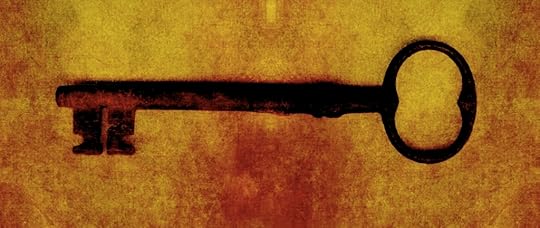
It has been a difficult few weeks as an author, to the point that I’m not sure what ‘being an author’ means any more.
There are ideas to explore and words to write. I am still thrilled that my third book, Beast, is being published at the end of July. I am still excited about book number four, currently 35k words in. So, that part is sorted. But as an increasingly poorly paid and insecure profession, I just don’t know.
Our culture has a horrible relationship to creators in any field. It is a relationship that at once elevates and diminishes. Makers in the arts are seen as having some savant connection to ‘creativity’ that allows them to do this thing that requires imagination and skill, making something to enjoy or sharpen intellect or emotional intelligence against, or simply to ease boredom, fill time. These makers have a key that confers a special but apparently worthless status – because it is the key, not the holder, that makes the magic.
Many who come to author events are hoping they will be shown where to find their own key so they can take part in the magic, publish a book. So, it’s kind of a great thing to do, but anyone who finds the key can do it. No one is happy when you tell them that the key is work. Then more work.
This is explicitly not saying that only certain people can do this, it is to disavow the idea that there is anything mysterious or special about it. It is to say it is all work.
With the gormless advances of AI we are in the middle of the most sweeping erasure of the value of that work. It feels personal. The publisher of my first two books has gone into liquidation and reformed as a new entity that feels no obligation to pay the authors royalties they are owed – though they may make some ‘goodwill’ payments in time. Some are owed many thousands. I am owed enough to miss as a part of my scratchy income.
Almost worse than that, they have brought in someone to ‘turn it around’ whose other project include using AI to create a tool to ‘help’ authors. I heard a talk in which he said that you can keep track of the number of minutes you have been working.
Minutes.
Fuck you, man.
But given the nature of the previously discussed elevation, clearly for some people there is a cache to having written a book. There are people who want to write a book as a way of accessing that cache, just as in younger days when I knew many who wanted to be rock stars, without necessarily being obsessed with music. Good for them. Why wouldn’t they? It’s just that it is a poor starting place for good art.
If you can write a shonky outline, press a few buttons, steal the voice of any author whose work has been rinsed without permission by the big AI models, and lo, produce a book with your name on the cover, what happens to that cache? It will be as glamorous as operating a photocopier.
I have heard people claim AI is going to ‘democratise’ the arts. This is bullshit. It’s already democratic (the gatekeeping is another matter that will in any case not be addressed by making it all push-button easy.) It’s already democratic, it’s just an awfully huge amount of work. And it’s not usually very rewarding. No one is stopping you, wanna-be-author dude! Go ahead, write a damn book – without stealing someone else’s work and producing the carbon emissions of a medium to large city. Is any new book important enough to chew even further into scarce planetary resources?
It feels bleak. I presume that small rewards will get smaller. And I presume that people will make the assumption that AI has been part of the process, regardless. People will never know I didn’t cheat and I will never know how many books have been churned out in minutes, trained on work that took me years.
There are great companies like Bluemoose, the publishers of Beast, who explicitly will have nothing to do with AI. And then there are others, who are grabbing at the amazing, vital, wonderful world of books and squeezing the living tits off it all for the dank equivalent of a photocopied report. Yay, it only took minutes to produce.
Who will be left with the magic?
October 15, 2024
Where We Are
(We are not in Gaza)
At first glance there seems to be so many steps; for me, for the lady reading her book across the aisle, the gentleman settled in peaceful reverie gazing out of the window. For all the passengers on this train. So many steps to take, to fall. Seven circles, down and down and down.
I am mildly stressed. Memories of disorganisation, missed trains, travel disasters. These vague and familiar hauntings have come along for the ride. Perhaps the lady opposite has recently received bad news and hides from it in the fat pages of her family saga. Perhaps the gazing man is lonely. The ordinary lows of an ordinary day.
It can get worse. I change trains. A bag of Revels from W H Smiths on the concourse costs three quid. In the dingy waiting room, the extortionately expensive cheese and onion pasty burns my mouth. It is noisy and gloomy. A melancholy man opposite looks into nothing as he absently strokes his phone screen with the back of his finger. Maybe he is trying to decide (a tussle between a broken heart and weary common sense) whether to call, again, an estranged lover. And still, so many steps down.
So many steps between our easy, ordinary, harried, safe day and the day of a family in Gaza whose son, whose brother was burnt to death in a hospital while all the world looked on.
Yet there is only one step. One simple step. One that we, thank the gods, cannot make. It is a mere accident of birth. That boy, and many thousands like him, didn’t have to take any steps into their hell. Though some may have chosen the ragged gestures of resistance that Isreal says makes them an enemy, all it takes, now and in the past, is the simple fact of having been born a Palestinian in Gaza.
The man next to me lounges comfortably, coughs without troubling to lift a hand. Keeping my elbow clamped to my side, away from the intruding spill of him, I reach for my coffee. A spillage burns my leg. I am tired. I couldn’t get to sleep last night because this terrible news, this live-screened genocide filled me with such torment and misery. The helplessness, the lack of any sense of what to do. The vile passivity of watching it unfold.
The howling horror of it. Gaza, Congo, Sudan.
What do we do? What gestures can we salvage from beneath the proclamations of a government that will only ‘urge restraint’ whilst pompously, cravenly, intoning Israel’s right to ‘defend’ itself.
How dare you speak for me, for the British people, with your limp, death-wish words. How dare you.
When this time is done we will need new coinage. We will need to find replacements for the words restraint and defend, so fully have these two lost their meaning.
And yet this day, for me is a good one. I am taking a lucky journey. Tears for another, however genuine the cause, do nothing to help. It is not my own humanity that needs exercise or exhibition. I have to find something, some pathetic little levers. Perhaps all of us pulling small levers will make change.
Now social media has ruthlessly pared away any scrap of attention that does not pertain directly to itself, fundraising no longer seems to work. So I am starting a monthly donation to Mecical Aid for Palestin, a small tax on the work I sell.
And I am paying attention to the BDS Movement. It stands for:
Boycott
Divest
Sanction
This was a tactic that had an impact during the South African apartheid era and surely will do something against this new (and shockingly old) apartheid. Of course there are Israelis who don’t deserve the censure, just as there were South Africans.
But this is where we are.
I cannot, under the cloak of my blessings, the shade of my feeble government, the incomparably easy weight of my every day cares, simply watch as children die, as families are hideously bereaved. People who in another world might sit next to me on a train, are savagely exterminated. I cannot just keep watching, keep feeding horror to helplessness.
So I’ll try pulling those little levers, knowing it is not enough. That is where I am. And it is no answer. But it is all I have.
August 3, 2024
Farewell, Launch Man
Martin Phillipps
This is a short tale, in appreciation of Martin Phillipps. As many of you already know, he wrote and played wonderful songs, predominantly with his band, The Chills. The opening bars of Pink Frost is in my audio delicious top ten, though for me the real wonder was in his lyrics. As well as the much loved and widely acclaimed music, he was a great person, calm, quiet, richly smart and funny. He was also Launch Man, and he took our childish popcorn provocation and turned it into grown-up, rusty-dark, velvety art.
This story, though short, requires a bit of setting up, so bear with me.
I found myself in New Zealand, down south in Dunedin, a town known for its vibrant musical culture. I ended up staying for a fantastic couple of years, living in Victorian wool warehouses, doing art, learning drums, playing music and having a great time with wonderful people. I miss them still.
For a while I lived, and later played, with King Loser, Chris and Celia (one day I will write properly about my friend C) in a disused karate dojo. Celia and I played pool as a doubles partnership. I was quite good, she was rubbish. Our USP: it’s not about winning, it’s about being really bad losers. We came to the table once and someone said in heartfelt tone, ‘Oh no, it’s the Pool Bitches!’ Well, that stuck – with pride. My friend Marco in Hawaii even sent us baseball caps. It was probably the only time ever that Celia would dream of wearing such an item. I cannot believe that over the years and miles mine got lost.
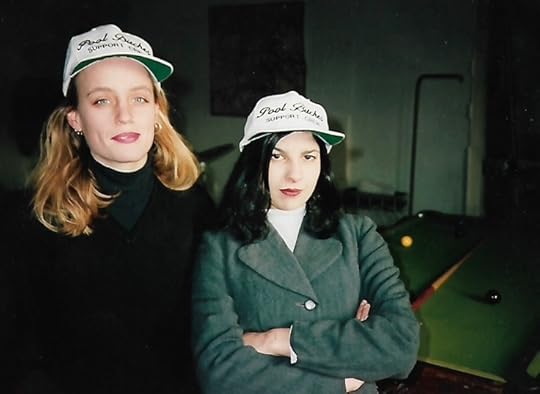
Me and Celia in our Pool Bitches baseball caps. Celia wears hers with a vintage two piece. I was probably wearing lipstick to stop her nagging me about making a bit more effort with my style.
For now unknown reasons, one drunken night, we gave some of our dear friends nicknames, which were Staunch Man, Raunch Man and (particularly unfairly) Paunch Man. Later we added, by mutual consent, Graunch Man and Launch Man. We saw it through to the extent that, in rudimentary fashion, we screen printed each of them, with absolutely zero printing set up, an op-shop T-shirt with their new names.
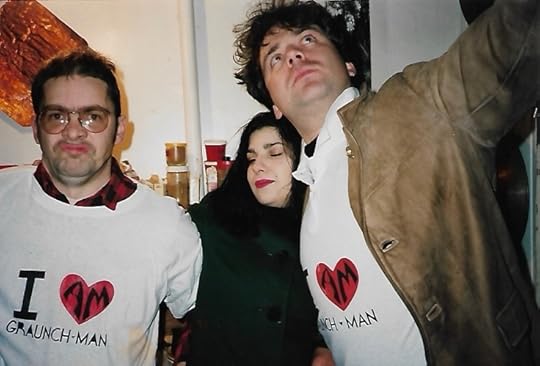
Bob (graunching nicely) Celia, and Martin (launching heroically) – showing off our screen printing skills.
Down the line, as these were all formidable musicians, (though perhaps, in hindsight, not necessarily with enough time on their hands to be as fully committed to our entertainment as we were ourselves) we set them a song writing challenge. I had recently finished reading a novel, about Godzilla and Gojira. Sadly I can’t remember the title and author to properly credit – if anyone has any ideas, I’d love to hear them. But this book gave me the song title: Aunch Men Versus Pool Bitches on the Streets of Forgotten Cool.
Life changed, I moved back to England to wait for my first daughter, Lilian. We lived in Brighton. A few years down the line I heard that The Chills were playing in town. I went along to the gig, glad to know I would, albeit briefly, catch up with an old friend.
In the middle of the set came a moment of magic. Martin, the world’s least histrionic rock star, said in his laconic way ‘This one’s for the Pool Bitches in the audience.’ They played Streets of Forgotten Cool. I roared YES! With my arms in the air. In a room full of people, and not a one of them knew or cared about my obnoxiously triumphant fist pumping moment, my winning-at-life glee. By the skin of my teeth I avoided turning to strangers, mad-eyed with elation, saying ‘it’s me! It’s me! I’m the Pool Bitch!’ It was both tragic and glorious.
This is of course, a small thing, however big it bounced me, but it is also a testament to his amazing creative talent, and beautifully understated sense of fun. It was an honour to briefly know Martin, one of the people who really could describe the world for the rest of us, in all its bittersweet, dark and murky beauty.
Thank you Marty. Go well x
An honourable mention has to go to Bob Scott who actually wore his Graunch Man T-shirt when The Bats played Brighton – truly my cup* ranneth over. Love to you Bob, I hope our paths may cross again x
*wild glee and ego
Wasted lives that used to shineThen stand around and wait in line
To beat the bitches playing pool
Down the streets of long forgotten cool
May 21, 2024
Writers Who Inspire Me
It has always been easy for me to be swayed to tears or joy by stories, but the first book I remember having an emotional impact was Tales from King Arthur. I was about seven, and broken hearted; all of Arthur’s wise intentions, all his unlikely golden goodness, was wasted. Why oh why did Lancelot and Guinevere have to spoil it all? (It was above my pay grade at the time to understand the complex, very human drive of desire.) Something in me clung to that special sadness, the hope of it, the dashed hope and somehow, within, the gift of transcendence.
For a long time the authors that meant the most to me were the ones who revealed a world at once filled with the possibility of love and torn apart by its absence. Authors that made me cry. Authors who yearned for a different kind of world. In my early teens, E. M. Forster was my favourite author. His gentle plea and relentless disappointment seemed somehow to prove that a better world was possible. The death of Kent in King Lear made me weep every one of the many times I read it, as a part of my A level curriculum.
Then as my understanding of the world grew, so my love for a broader spectrum of writing emerged. The tender brutality of Genet, a defiant mix of love and grime. I craved books that fed and stoked my feelings. Love, tender hope, misery, injustice, a sense that the status quo could be challenged. Authors who first provoked and then provided a home for my own emotions. Yes, feelings were everything. The bigger the better.

Sometimes I miss the wild, insistent intention of my younger self. But as I have got older, I have come to realise that emotions have a precious but limited value. They are only one part of a complex system, a part of how we read and then evaluate our situation. Calmer weather has left spaces for other things. I still cry, get angry, long for beauty when I read, and still deeply appreciate an author who can make it so. But I have come to most appreciate authors who do something quieter. I can’t think of how to describe it any better than saying they leave a space. A space for the reader in which to unfold, to get lost, to feel or not feel, to wonder, to be upheld, perhaps pulled around a little. Two recent favourites are Self Portrait in Green by Marie Ndiaye, translated by Jordan Stump, and Ducks, Newburyport by Lucy Ellman. The first is very short, the second very long, and both of these beautiful books have been written as though to open up an endless space where, with or without the easy hit of emotion, we truly share what it means to be human.
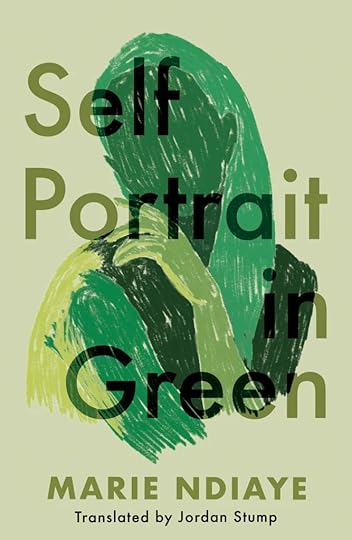
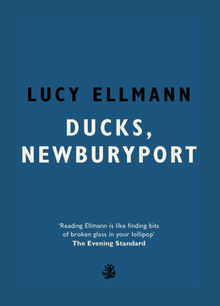
February 6, 2024
Dropped Pins on the Beauty/Catastrophe Slider
December 4, 2023
Jonny
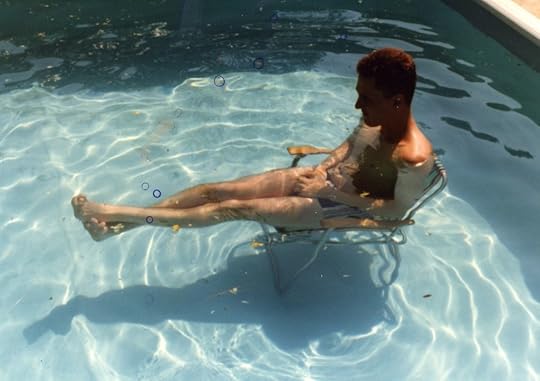
Jonny, you would’ve enjoyed the absurd calamity that kept us from attending your funeral this morning. We got up early and in honour of you, dressed in our finest. We drank some coffee, and were ready to hit the road for the sad drive to Reading Crematorium, to say goodbye to you. Unfortunately, it has rained, a lot. Dorset is a series of sodden villages joined by muddy lanes that for now think they are rivers. Sam drove into one, much deeper than anticipated, and the car stopped. The water came in, buggering the engine, seeped through the doors, making tide marks on her beautiful black taffeta skirt. It was seven in the morning, pissing down, and there we were. We tried different transport options but all had flaws and by the time we could get anywhere, it was too late to reach Reading in time. It was ridiculous, frustrating, but we all said we thought you would’ve enjoyed the absurdity of our predicament.
When you and I stopped being friends, when our friendship rather, was forced to grow into a new shape, it was one of the most upsetting times in my life. I’m not sure it could ever have been entirely put right, or could ever be put back to what existed before. But before that time, you were (and in so many ways remain) one of my dearest, most beloved friends.
You were one of the people I most enjoyed talking to. I think in moments, you genuinely believed that anything was possible. You were prepared to see the world as a place that, though odds-on was highly likely to confound, was a realm of mighty, wondrous possibilities. I think there was always a battle for you with the confounding side of the equation. I think things often seemed to you fatally just shy of your grasp. I was so angry with you for falling into addiction, but like Soapy said, everyone who falls that fall was united by some grief or another, and I think you would appreciate him saying that you all shared, in that pretty bleak time, a camaraderie. The camaraderie of the hopelessly romantic, and I have to say a camaraderie of the fucking annoying.
We went through many things together as friends, Jonny, and for so many of my life’s biggest moments, it’s disasters and it’s celebrations, you were one of the first people to know about it, to share in it and to help me through it. We had so much fun as well. I’m not going to list the memories and the anecdotes, but there are so many and I will always cherish them. I have to say, though, I have never not been glad that we didn’t move in to that building site caravan in Kentish Town.
You were an extraordinary man, Jonny Wilkes, so intelligent, funny, entertaining, sharp and witty; often extremely exasperating, not always honest. You were a true romantic. The ability to see all of that beauty, all of that mystery, the ability to cherish those you loved, and to will for them the full wonder of life – it was a gift. And so many people loved you. That never seemed to evade you.
For decades of my life, Jonny, you were one of the most important people in it. I will forever be grateful. And I’m so sorry that the absurdity of a fucking massive puddle stopped us from being there today to join everybody who loves you in saying goodbye.
Go well my friend.
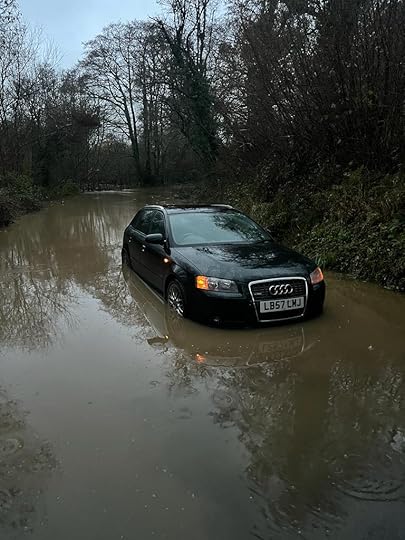
April 21, 2023
Shades
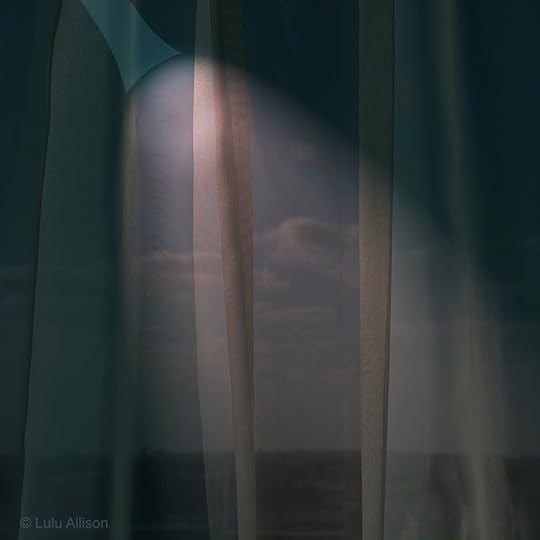
17 April 2023
Today, thousands gather to run the annual Boston marathon. For most it will be a day of joy and achievement, time spent strengthening bonds within family groups and a wider community of runners. It is also the ten-year anniversary of the terrorist attack that killed three and injured hundreds in 2013.
It marks, strangely, and in a very different key, an anniversary for me too. Indirectly, the Boston marathon terrorist attack was one of the reasons I began writing.
Ten years later I am on a train to Birmingham to take part in training for a project organised by the Royal Literary Fund and Writers Mosaic. The project is called Reading Round. Eventually, I will be one of twenty authors charged with setting up and leading reading groups across different regions and different communities in the UK. The aim is that reading habits are broadened, diversified and enriched.
I am not sure what to expect from the training but I am looking forward to it. And surely it is proof that I am, still somehow unexpectedly, a writer.
We are shaped by our environment. We learn the world from within a context influenced or entirely authored by our society and media, by our dominant culture and our personal habits. A news editor must know their consumers as well as they know the news. What we learned at school might shape our reading habits lifelong. The papers we read, the news platforms we trust, the cultures we consume give us a certain, partial view of the world. Some seek to evade this narrow remit, actively reach for wider and deeper truths, stories that are shaped by different sources. Many, equally, accept the story that falls before their eyes.
It is impossible to know everything. Our knowledge, our understanding stretches like a torch beam, out from a bright centre of focus, fading in a sweep through a ring of dusk and into darkness. We forget, often, that this darkness is not equivalent to absence.
The Boston marathon bombing was the focus of all the media in the UK. A joyful day had become a tragedy. The papers described the lives of those killed and injured, inviting us to understand the value of what had been lost.
In 2013 my family were dealing with our own tragedy, the sudden death of my step brother, Jonny, from an undiagnosed heart condition. Grief and loss were on my mind. Where it belongs, how it is shared, how we participate in the grief of others.
Also in 2013 the west was engaged in war with Iraq and Afghanistan. People going about their business were being killed by terrorist bombs and by drone strikes, the accidental collateral of actions increasingly ordered by Nobel peace laureate, Barack Obama. The news reports gave us a location, the type of strike, the tally of victims. That was it. The victims were not even named. The details of what had been lost unmarked.
My thoughts drifted on a long slow path, in and around these circumstances, wondering about shared and private grief. Wondering about the lives so easily dismissed behind the tally of deaths recorded in a small paragraph inside a newspaper. Wondering about the people for whom these deaths were as piercing and brutal as the death of my step brother was for my own family. I thought about the families connected to the victims in Boston. I wondered about the nature of distance as it affects empathy. Whether this distance is measured geographically or, it seemed, culturally.
I wasn’t a writer then, I was an artist. In May of 2013, as a response to this time of quiet thinking, I started what I described as an art project. I began writing a blog where, by invention, I tried to imagine the reality of the unnamed people dying in the daily tragedies in Iraq and Afghanistan. In almost real time I sought out these bald little news items, and for every unnamed person in that bleak, spare tally, I wrote a short portrait. I thought by making them up it might in some way make them more real. Real enough to grieve. The writing would improve, and I hope ten years on that is still so. But it was the first creative writing I had done since school.
21 April 2023
I was perplexed about the legitimacy of the project but felt the need to continue. I was wary of trespass, ignorant of the ways their lives had been lived, how a mother in Baghdad might pass her day, how a grandfather in Kabul might have occupied the world. I wanted to try to be somehow specific but universal. I wanted to see how we might care about these relentless, daily tragedies.
After around four months it became too much, too sad, too bleak. I mothballed the newspaper searches but the habit of writing stayed with me and the project became my first novel, Twice the Speed of Dark.
Writing was a revelation for me. I felt like I had discovered what I should have been doing all along. I don’t celebrate this as an anniversary – that day in Boston was too bleak a marker. But, still buzzing, back from working for three days with an incredible group of writers and Royal Literary Fund lectors, I am profoundly grateful for the discovery of writing for myself, and for the beautiful ability that literature has to explain and share the wider world, to shine a beam as far as we are willing to see.
July 8, 2022
Black Rocks and Sparkling Seas
When I wrote Salt Lick, I used the dam building in woodland streams because I wanted to convey the blessings of Jesse’s childhood, a straightforward lifting from the blessings of my own.
 Lulu Allison, contemporary fiction author
Lulu Allison, contemporary fiction author
Last week we gathered for my father’s funeral. Though sad, still sad, it was a very happy occasion. He had asked that we lay on a party that he would’ve loved to be at. We certainly did that and he was greatly missed. My brother and sister both spoke at the service and I wrote the piece following this introduction, which was printed in the Order of Service.
My parents divorced many years ago and both went on to have very happy and successful relationships with other wonderful people. They remained great friends. That past and beautifully revised relationship was not marked during the service and I wished that there had been a way to acknowledge it. So, whilst this piece is about my Dad, it is also a way of honouring my Mum, their time together and the wonderful childhood they both made for us.
Black Rocks and Sparkling…View original post 758 more words

